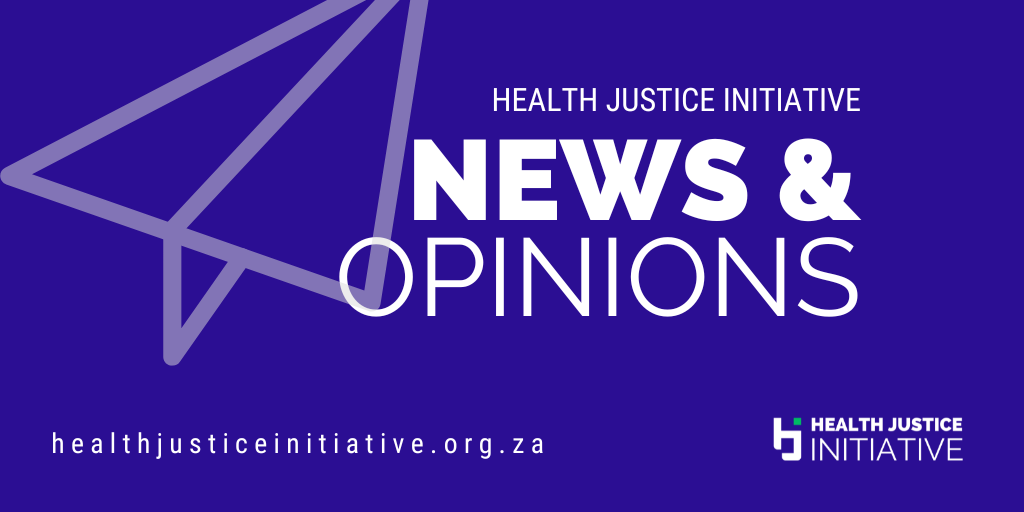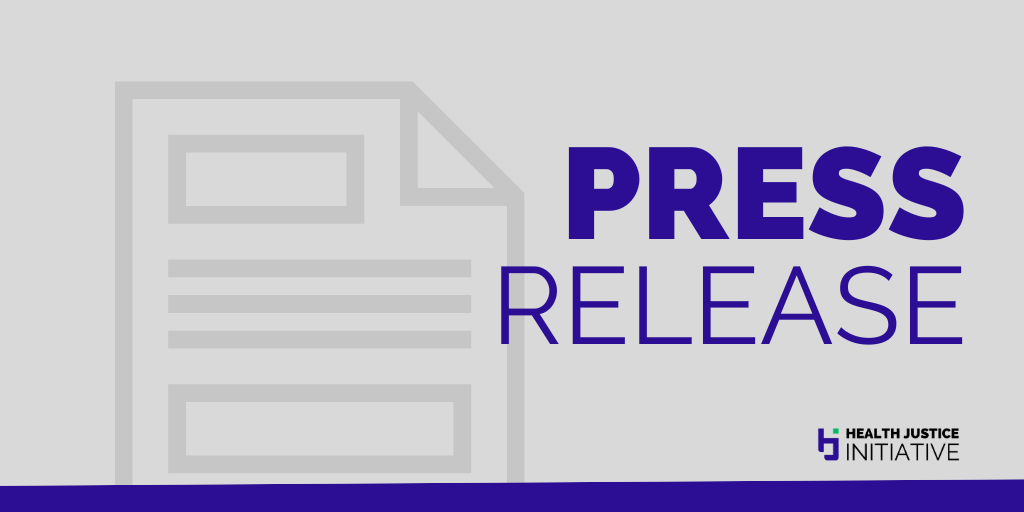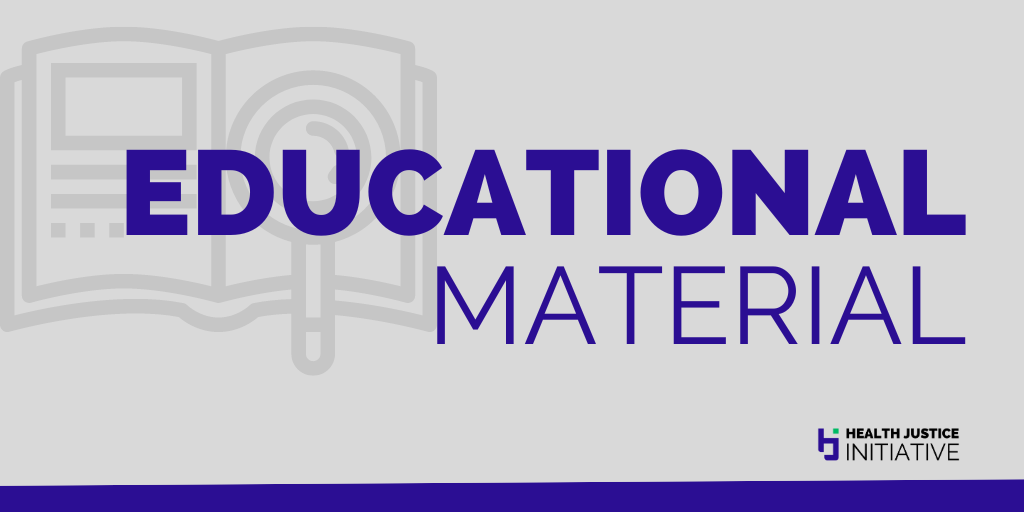HJI statement on Afriforum & Solidarity’s withdrawal of its vaccine procurement urgent application
Health Justice Initiative (HJI) Statement on Afriforum and Solidarity withdrawing their vaccine procurement and allocation case against Minister of Health & 16 Others (HJI amicus curiae)
‘There should be no vaccine apartheid in South Africa’ – Fatima Hassan, HJI Head said today in Cape Town.
The Director-General (DG) of Health (for the first and second respondents) agreed with HJI’s expert evidence and relied on it in his replying papers. The case sought to entrench a situation constituting vaccine apartheid in South Africa. All while major industry players and business groups including medical schemes in South Africa support a national allocation strategy in partnership with government.
Due to the formal withdrawal of their case, Afriforum and Solidarity have not responded on record to the expert evidence introduced by the HJI. This is concerning as we are unaware of which public health experts and public health evidence they are relying upon to justify an approach characterised by self-interest, rooted in vaccine nationalism and elitism (which is to seek to procure and allocate vaccines outside of a national allocation framework and strategy) and which goes against principles of prioritisation and equity in a pandemic.
Such an approach also disregards the guidance of the World Health Organization (WHO), the WHO’s Strategic Advisory Group of Experts on Immunization, multiple United Nations experts, the International Commission of Jurists, and the African Union.
We are extremely concerned that in a pandemic Afriforum and Solidarity seem to be promoting unqualified vaccine selection and allocation. The South African government has a constitutional duty to prevent this from taking place, as the consequences for health and human rights, equity, socio-economic and racial justice are dire. This is because the private health sector and medical schemes serve a very small, and mostly employed, population in our country.
It is important to note that vaccine shortages everywhere in the global South are mainly due to vaccine manufacturer monopolies and the enforcement of patents and other Intellectual Property protections in a pandemic that has resulted in self-created global scarcity and global vaccine apartheid, without transparent pricing systems and, now, requests for vaccine manufacturer liability indemnity too. These issues have not been addressed or acknowledged by Afriforum and Solidarity, at all.
We do share the concerns expressed by many others that Government and the National Department of Health especially, have thus far, not been sufficiently proactive or transparent on this issue of grave public interest. Government communication has regrettably been patchy and inadequate. We are also aware that Government is trying to build a public-private partnership to reach consensus on rationing – based on public health evidence to achieve a national equitable allocation framework and strategy which relies on international best practice and guidance.
We are therefore concerned that Afriforum and Solidarity have attempted via the withdrawal of its case to convey an incorrect impression of the status quo regarding vaccine access in South Africa and the world – without basis or evidence – and worryingly, urging private players to undermine globally accepted public health evidence and principles around equity and prioritisation for widespread population immunity purposes.
Further, we should point out that some of the statements that Afriforum and Solidarity rely on (attributed to the DG of Health’s affidavit) are taken out of its broader context and in fact neglect to mention the other key parts of the same affidavit – this point to a gross misunderstanding of the medicine approval and pricing system in South Africa applicable to the private sector. In the unlikely event that they are permitted to allocate vaccines on its own before the most vulnerable people in our country receive a vaccine- it will enable civil society to challenge the pricing of multi-national vaccine manufacturers because of the manner in which the Single Exit Price medicine pricing system works. There are also several questions that Afriforum and Solidarity must still address – as these are not dealt with in its papers.
Given our unequal health care system, it is regrettable that Afriforum and Solidarity have not yet formally and in writing committed to equitable allocation and prioritisation plans (where the private sector works in partnership with government, as have most other leading private sector role players and medical schemes) and instead seeks to convey the impression that it wants to further perpetuate a system of privilege and exclusion. This gravely concerns the HJI, as no one in South Africa should be allocating vaccines outside of a nationally accepted strategy.
Privilege in a pandemic, should not be the proxy for access, here and globally. And, to the extent that government has not yet passed the regulatory measures needed to ensure equitable access and a single allocation system, this is a matter that the HJI will pursue and remedy. Finally, we call on all role players in South Africa to unite in purpose and to reach consensus on a single equitable application framework and plan (One Country, One Plan)– this includes the Ministerial Advisory Committee on the COVID-19 epidemic and especially the Ministerial Advisory Committee on Vaccines; all other scientific experts and advisors, and the private sector.
We are in a pandemic – we need one plan for our country to achieve widespread population immunity. That Afriforum and Solidarity (or others) wish to go against a growing body of international scientific evidence on this issue, is plainly, shameful.
For media comment please contact: [email protected]
Access the Fact Sheet here.
‘Government admits private sector may purchase Covid vaccines’ 2 March 2021 https://solidariteit.co.za/en/government-admits-private-sector-may-purchase-covid-vaccines/ Papers from the urgent application is available from https://powersingh.africa/wp-content/uploads/2021/02/210222-Solidarity-and-Afriforum-Application.pdf See the expert affidavits here: https://powersingh.africa/2021/02/21/solidarity-and-another-v-minister-of-health-and-16-others/ HJI is represented pro bono by Michael Power and ‘S’lindile Khumalo of Power Singh Inc and by Advocates Geoff Budlender SC, Faizel Ismail SC and Lerato Zikalala. Global South against Xenophobia, Lawyers for Human Rights, and the South African Human Rights Defenders Network “Open Letter to the President – Covid-19 vaccine for undocumented people”. https://www.news24.com/news24/Opinions/Letters/open-letter-to-the-president-covid-19-vaccine-for-undocumented-people-20210224 Towards a People’s Vaccine Campaign, available: https://c19peoplescoalition.org.za/towards-a-peoples-vaccine-campaign-a-call-to-action/ [5] Given substantial public investment and co-funding, HJI has stated with others, that price transparency is missing in this pandemic, globally and here, creating a drain on the national fiscus – harming the public interest and also sound budget principles. For example: how will parallel programmes not using central allocation strategies result in widespread population immunity given that no vaccines have as yet been registered for general use, and where the public can only access vaccines that are registered for use based on proper regulatory review (which means ‘consumer choice’ is a misnomer in this context); whether it supports the enforcement of IP protections in a pandemic that have a direct bearing on manufacturing capacity and scarce supplies; how will competitive private procurement not result in a reduction of supplies for national programmes in a context of global scarcity and supply shortages; the details of which manufacturers it is/has actually negotiated with given that almost all vaccine manufacturers are not as yet dealing with private players, and where multilateral mechanisms (COVAX, AU VATT) are only selling to states; whether it has the ability to set up no fault compensation schemes as requested by almost all vaccine manufacturers– and its views on that in a pandemic; and how it intends managing acquisition and allocation, while research data on variants and mutations are still emerging.




